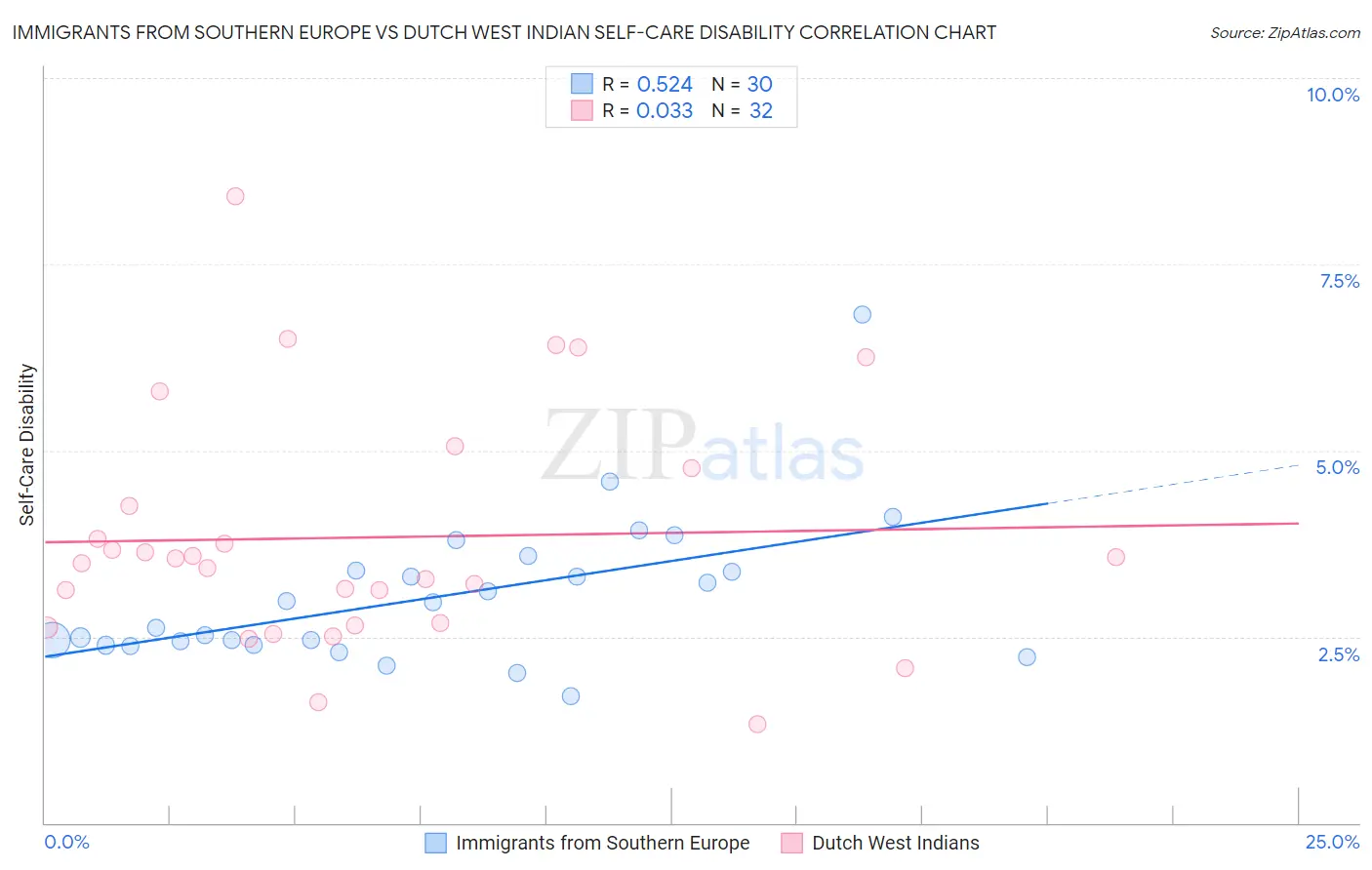Immigrants from Southern Europe vs Dutch West Indian Self-Care Disability
COMPARE
Immigrants from Southern Europe
Dutch West Indian
Self-Care Disability
Self-Care Disability Comparison
Immigrants from Southern Europe
Dutch West Indians
2.5%
SELF-CARE DISABILITY
15.6/ 100
METRIC RATING
195th/ 347
METRIC RANK
3.0%
SELF-CARE DISABILITY
0.0/ 100
METRIC RATING
333rd/ 347
METRIC RANK
Immigrants from Southern Europe vs Dutch West Indian Self-Care Disability Correlation Chart
The statistical analysis conducted on geographies consisting of 402,329,644 people shows a substantial positive correlation between the proportion of Immigrants from Southern Europe and percentage of population with self-care disability in the United States with a correlation coefficient (R) of 0.524 and weighted average of 2.5%. Similarly, the statistical analysis conducted on geographies consisting of 85,744,366 people shows no correlation between the proportion of Dutch West Indians and percentage of population with self-care disability in the United States with a correlation coefficient (R) of 0.033 and weighted average of 3.0%, a difference of 18.6%.

Self-Care Disability Correlation Summary
| Measurement | Immigrants from Southern Europe | Dutch West Indian |
| Minimum | 1.7% | 1.3% |
| Maximum | 6.8% | 8.4% |
| Range | 5.1% | 7.1% |
| Mean | 3.0% | 3.8% |
| Median | 2.8% | 3.5% |
| Interquartile 25% (IQ1) | 2.4% | 2.7% |
| Interquartile 75% (IQ3) | 3.4% | 4.5% |
| Interquartile Range (IQR) | 1.00% | 1.8% |
| Standard Deviation (Sample) | 1.00% | 1.6% |
| Standard Deviation (Population) | 0.98% | 1.6% |
Similar Demographics by Self-Care Disability
Demographics Similar to Immigrants from Southern Europe by Self-Care Disability
In terms of self-care disability, the demographic groups most similar to Immigrants from Southern Europe are Korean (2.5%, a difference of 0.010%), Crow (2.5%, a difference of 0.030%), Immigrants (2.5%, a difference of 0.060%), Immigrants from Ghana (2.5%, a difference of 0.080%), and Immigrants from Germany (2.5%, a difference of 0.19%).
| Demographics | Rating | Rank | Self-Care Disability |
| Immigrants | Oceania | 28.3 /100 | #188 | Fair 2.5% |
| Immigrants | Eastern Europe | 28.0 /100 | #189 | Fair 2.5% |
| Sioux | 24.6 /100 | #190 | Fair 2.5% |
| Moroccans | 22.9 /100 | #191 | Fair 2.5% |
| Soviet Union | 22.2 /100 | #192 | Fair 2.5% |
| Ukrainians | 21.4 /100 | #193 | Fair 2.5% |
| Immigrants | Germany | 17.9 /100 | #194 | Poor 2.5% |
| Immigrants | Southern Europe | 15.6 /100 | #195 | Poor 2.5% |
| Koreans | 15.5 /100 | #196 | Poor 2.5% |
| Crow | 15.2 /100 | #197 | Poor 2.5% |
| Immigrants | Immigrants | 15.0 /100 | #198 | Poor 2.5% |
| Immigrants | Ghana | 14.7 /100 | #199 | Poor 2.5% |
| Immigrants | Western Africa | 13.3 /100 | #200 | Poor 2.5% |
| Immigrants | South Eastern Asia | 12.9 /100 | #201 | Poor 2.5% |
| Slovaks | 12.6 /100 | #202 | Poor 2.5% |
Demographics Similar to Dutch West Indians by Self-Care Disability
In terms of self-care disability, the demographic groups most similar to Dutch West Indians are Houma (3.0%, a difference of 0.070%), Immigrants from the Azores (3.0%, a difference of 0.12%), Kiowa (3.0%, a difference of 0.23%), Immigrants from Yemen (3.0%, a difference of 0.28%), and Lumbee (3.0%, a difference of 0.59%).
| Demographics | Rating | Rank | Self-Care Disability |
| Paiute | 0.0 /100 | #326 | Tragic 2.9% |
| Blacks/African Americans | 0.0 /100 | #327 | Tragic 2.9% |
| Hopi | 0.0 /100 | #328 | Tragic 2.9% |
| Cajuns | 0.0 /100 | #329 | Tragic 2.9% |
| Nepalese | 0.0 /100 | #330 | Tragic 3.0% |
| Lumbee | 0.0 /100 | #331 | Tragic 3.0% |
| Kiowa | 0.0 /100 | #332 | Tragic 3.0% |
| Dutch West Indians | 0.0 /100 | #333 | Tragic 3.0% |
| Houma | 0.0 /100 | #334 | Tragic 3.0% |
| Immigrants | Azores | 0.0 /100 | #335 | Tragic 3.0% |
| Immigrants | Yemen | 0.0 /100 | #336 | Tragic 3.0% |
| Choctaw | 0.0 /100 | #337 | Tragic 3.0% |
| Cape Verdeans | 0.0 /100 | #338 | Tragic 3.0% |
| Immigrants | Dominican Republic | 0.0 /100 | #339 | Tragic 3.0% |
| Immigrants | Cabo Verde | 0.0 /100 | #340 | Tragic 3.1% |